

4 Questions to Ask when Planning an Inquiry Lesson – Rise over Run. Incorporating inquiry into a math lesson has many benefits (as outlined here), but creating a quality inquiry-based lesson can be a challenge.
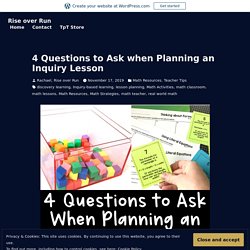
Below are 4 questions that can spark planning and lesson ideas for discovery lessons. Is this a hands-on concept? When a concept can be taught with physical objects or models, use those to guide your lesson planning. Many geometry topics fit in this category. 50 Questions To Help Students Think About What They Think - TeachThought. Contributed by Lisa Chesser Using the right questions creates powerful, sometimes multiple answers and discussions.
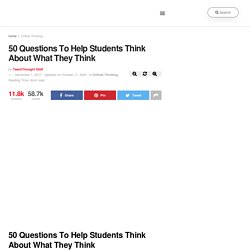
Aristotle said that he asked questions in response to other people’s views, while Socrates focused on disciplined questioning to get to the truth of the matter. Ultimately questions spark imagination, conjure emotions, and create more questions. The questions asked by a teacher or professor are sometimes more glaringly valuable than the information transferred to the students. Those questions spark a thought, which leads to a fiercely independent search for information. If students are the ones gathering that information then they’re the ones learning it and student-driven learning cements lessons into the students’ minds making any lesson more powerful with this strategy.
The questions are unrestricted and open the mind up to unfettered thought, perfect for innovation and understanding. See also our 28 Critical Thinking Question Stems For Classroom Use Logical Questions 1. Using Concept Routines to Drive Inquiries. Exploring concepts through inquiry can be a tricky area of teaching and learning to navigate.
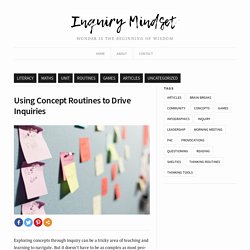
But it doesn’t have to be as complex as most people think. Concept routines are effective tools to help make students’ thinking visible and gather the data you need to set-up future investigations. A meaningful inquiry can be well-planned and structured without stifling creativity or giving too much away. These concept routines will help you to assess your students’ level of understanding, while giving you the data you need to drive your inquiries forward. True or False.
Use these routines frequently, so they become an integral part of the learning process in your classroom. I WONDER GRID. Mackenzie inset studentinq. Inquiry-Based Learning in Less Than Five Minutes. Kindergarten Holidays. 1st Grade Map Skills. NewYork 1 Economic Choices. 2nd grade Urban, Suburban, and Rural. Inquiry-Based Learning with a Wonder Wall - Second Grade Smiles.
3rd grade Geography. Supporting Question Where are we, as a class community, located?
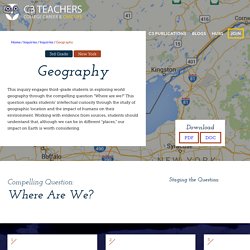
Formative Task Describe the location of the school using geographic tools and vocabulary. Sources Source A: Google Maps Supporting Question Where are we, as people on Earth, located? Formative Task Complete a two-column chart that describes the location of the world’s people in terms of population density. Sources Source A: Population density map Source B: Earth’s City Lights Supporting Question Why are we where we are? Formative Task Assemble an I Notice/I Think chart drawing conclusions about geographic factors that encourage or deter human settlement.
Sources Source A: Global climate zone map Source B: Global elevation zone map Supporting Question Where are the “human footprints” on Earth? Formative Task Create a concept web that makes and supports a claim about how the choices and actions of people influence our planet. Lesson Plans/ Activities. Here are some lesson plans that demonstrate Inquiry-based learning.
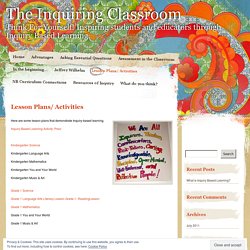
Inquiry-Based Learning Activity: Prezi Kindergarten Science Kindergarten Language Arts Kindergarten Mathematics Kindergarten You and Your World Kindergarten Music & Art. How To Get Into Inquiry-Based Learning: Part 1 – First Steps to Inquiry. How To Get Into Inquiry-Based Learning: Part 3 – 5 Skills to Become an Inquiry Teacher. EP69: Examples of Inquiry-Based Learning Activities. Caleb's Creek Media Matters: Spring Has Sprung! Last week was our Spring Break, so to welcome kids back and practice the Super 3 a little, I decided to do a lesson on spring with my Kinders.
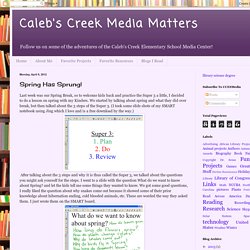
We started by talking about spring and what they did over break, but then talked about the 3 steps of the Super 3. (I took some slide shots of my SMART notebook using Jing which I love and is a free download by the way.) After talking about the 3 steps and why it is thus called the Super 3, we talked about the questions you might ask yourself for the steps. I went to a slide with the question What do we want to know about Spring? And let the kids tell me some things they wanted to know. Next, for the DO step of the Super 3, we talked about ways we could learn more about Spring to try to answer some of our questions.
After brainstorming, we read this book about Spring and talked about using books to gather information. This was a lesson that kept the kids engaged and interested which is hard with Kinders. Dinosaur Inquiry Lesson Plan. Tommie dePaola inquiry. At the end of the year I decided to change things up a bit with first grade and conduct an author study through a project based learning inspired format (CCSS RL.1.3, W.1.7).
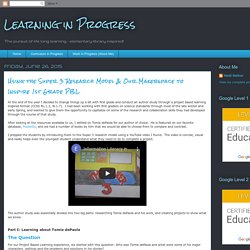
I had been working with first graders on science standards through most of the late winter and early Spring, and wanted to give them the opportunity to capitalize on some of the research and collaboration skills they had developed through the course of that study.After looking at the resources available to us, I settled on Tomie dePaola for our author of choice.
He is featured on our favorite database, PebbleGo, and we had a number of books by him that we would be able to choose from to compare and contrast.I prepped the students by introducing them to the Super 3 research model using a YouTube video I found. Inquiry Ideas. E is for Explore! Bugging You Inquiry. Flat Stanley. FlatSWorksheet. Everyday Inquiry in K-5 Social Studies: 3rd Grade - Using Inquiry to Launch Lesson: American Indians. Everyday Inquiry in K-5 Social Studies: 1st Grade - Rating and Ranking Historical Figures. Using a Wonder Week to Spark Student Inquiry.